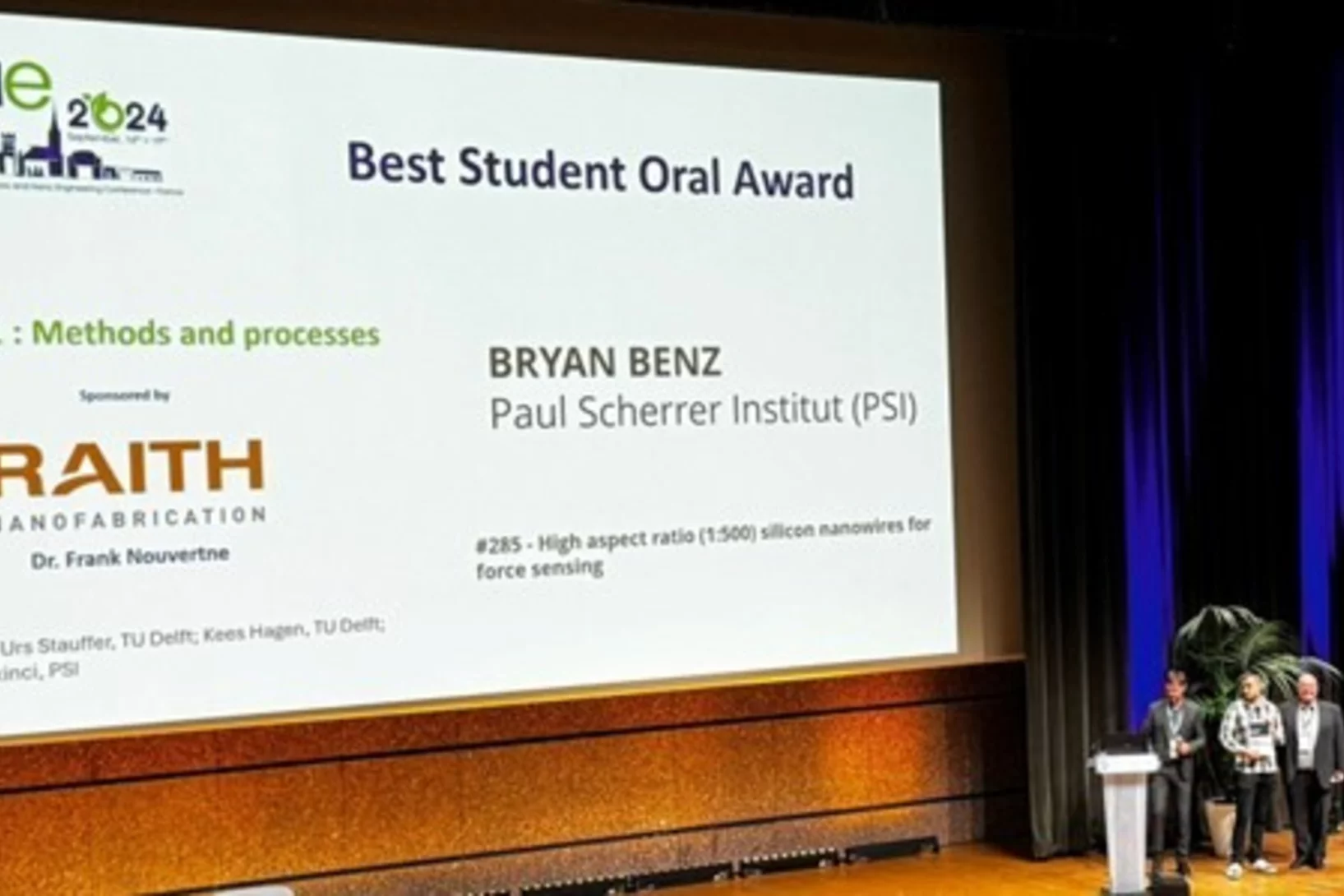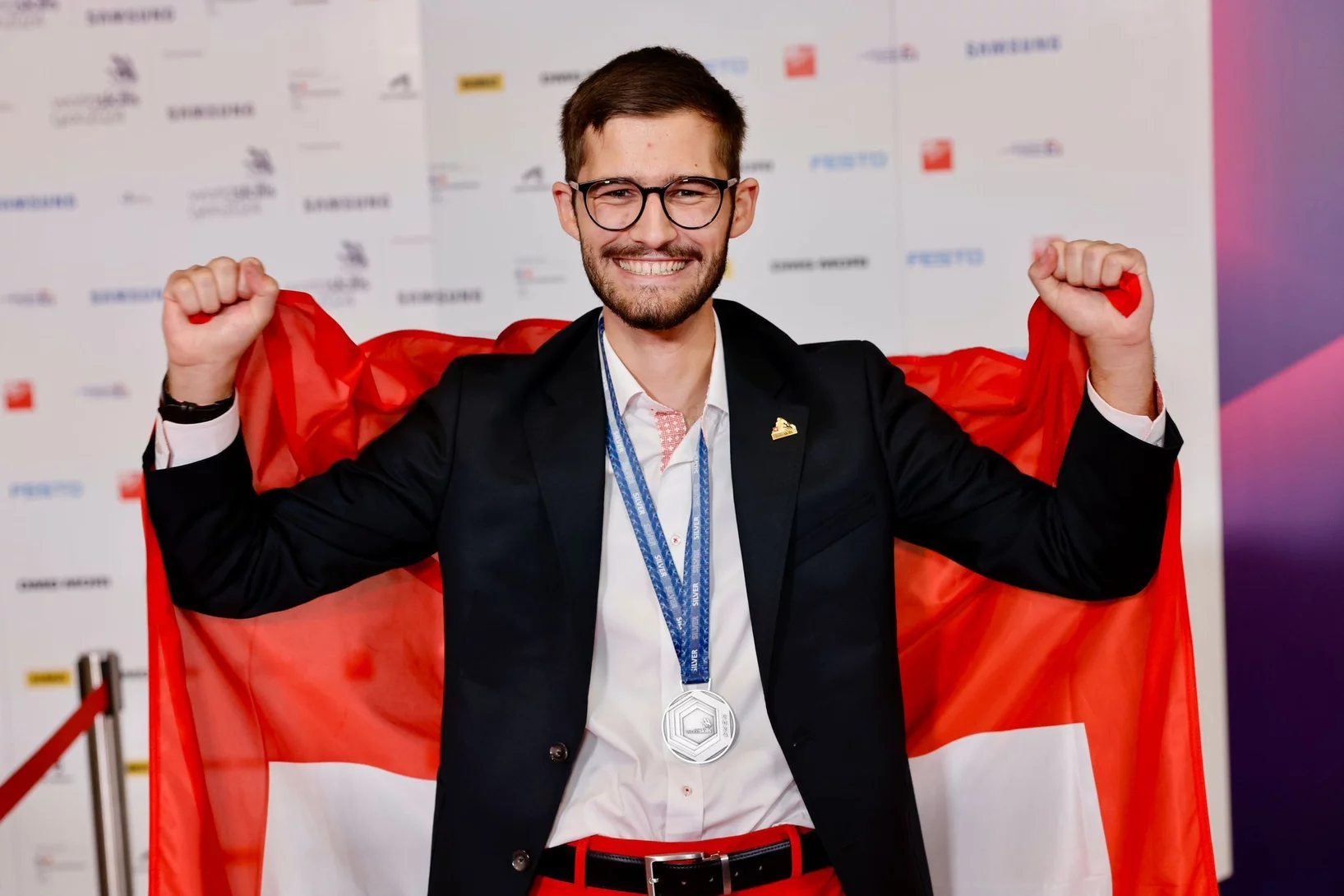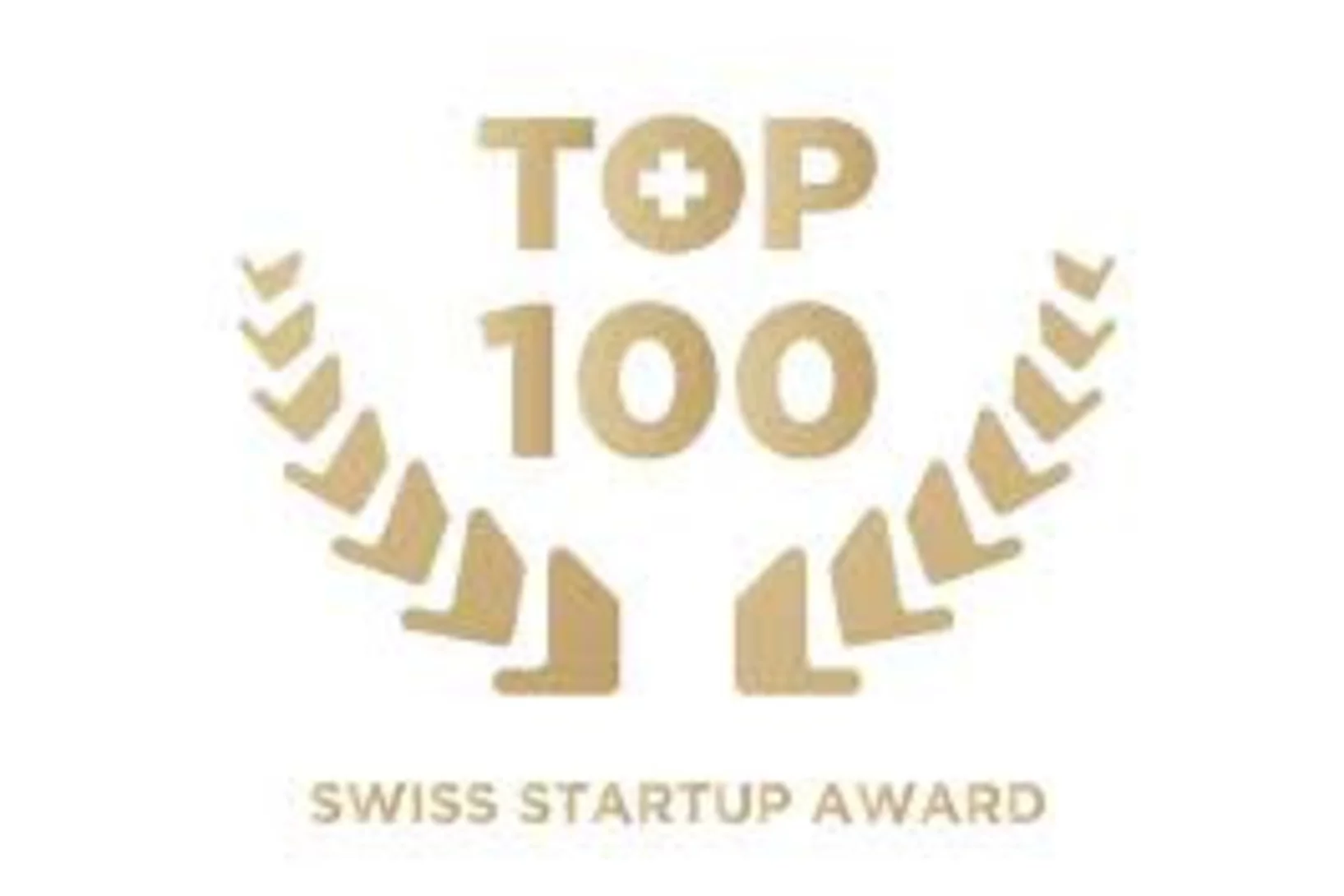La recherche énergétique de l’Institut Paul Scherrer se concentre sur la recherche de procédés susceptibles d’être utilisés dans des technologies durables et sûres pour un approvisionnement en énergie si possible exempt d’émissions CO2. Les énergies renouvelables constituent un point fort important. A la plateforme ESI (Energy System Integration), la recherche et l’industrie peuvent tester des solutions d’intégration d’énergies renouvelables. Un autre point fort de ce domaine est l’utilisation sûre de l’énergie nucléaire. Ces activités sont complétées par des analyses d’évaluation globale des systèmes énergétiques. Le PSI mène également de la recherche climatique et environnementale sur les processus chimiques qui se jouent dans l’atmosphère.
Pour en savoir plus, reportez-vous à Aperçu Energie et climat
XRnanotech remporte le Swiss Excellence Product Award 2024
La société XRnanotech AG a remporté le Swiss Excellence Product Award 2024 dans la catégorie PME. Ce spin-off du PSI a été récompensé pour ses développements remarquables dans le domaine des lentilles de Fresnel et des éléments optiques diffractifs (DOE).
Souder sur une grande scène
Ceux qui grimpent sur ce podium font partie des meilleurs talents professionnels du monde. Melvin Deubelbeiss, électronicien au PSI, a remporté la médaille d’argent aux WorldSkills 2024.
Skyrmion topology quantified in 3D
Researchers from an international collaboration between the United States of America and Switzerland have performed three-dimensional magnetic imaging of a magnetic skyrmion using soft X-ray laminography. This allowed for the investigation, in three dimensions, of the topological profile of the magnetic skyrmions.
iLab et SynFuels aux Energy Days ! au Musée Suisse des Transports
18, 19 et 20 octobre 2024
Le iLab de l'Institut Paul Scherrer participera aux Energy Days avec des ateliers passionnants. Découvrez comment nous pouvons stocker l'énergie renouvelable grâce à des technologies innovantes comme le Power-to-Gas et faire avancer la transition énergétique.
Mit dem Fanuc Industrieroboter zum erfolgreichen Bauprojekt
Im Herbst 2023 haben wir einen Fanuc Industrieroboter gekauft. Nach langem Warten wurde dieser am 1. Februar 2024 am PSI angeliefert. Leider musste der Roboter erst noch auf seine ersten Aufgaben warten, da ich zuerst noch meine praktische Abschlussarbeit beenden musste.
Déchiffrer l’énigme des protéines
Cette année, le prix Nobel de chimie est attribué à trois chercheurs qui ont contribué de manière déterminante à déchiffrer le code des protéines, ces importants éléments constitutifs de la vie. Mais pour que des applications puissent être développées à partir de ces connaissances, par exemple dans le domaine médical, des centres de recherche comme le PSI sont indispensables.
Dual-site reaction mechanism for the simultaneous reduction of nitrous and nitric oxides
We have applied three spectroscopic techniques (XAS, EPR and DRIFTS) in combination withe modulated excitation and catalytic data to decipher and propose the complete reaction mechanism of the simultaneous reduction of N2O and NO
Comment les catalyseurs éliminent des oxydes d’azote dangereux
En catalyse industrielle, le fer n'est pas égal au fer.
Lehrlingslager 2024
Dieses Jahr fand das jährliche Lehrlingslager des Paul Scherrer Instituts mit rund 70 Lernenden im Val Calanca statt. Während zwei Wochen arbeiteten die Lernenden in wechselnden Gruppen an vier verschiedenen Baustellen.
Discovery of charge order above roomtemperature in the prototypical kagome superconductor La(Ru1−xFex)3Si2
The kagome lattice is an intriguing and rich platform for discovering, tuning and understanding the diverse phases of quantum matter, crucial for advancing modern and future electronics. Despite considerable efforts, accessing correlated phases at room temperature has been challenging.
Ian Shipsey
The Mu3e collaboration is deeply saddened to by the loss of our colleague and friend Professor Ian Shipsey, Head of Department of Physics in Oxford and co-lead of the Oxford Mu3e group.
Career Perspectives at our Partners: Maria-Alexandra Paun, Federal Office of Communications
Our partners are interested in attracting PSI's early career researchers, and we introduce scientists working at partner companies to showcase career perspectives. In today's post, meet Maria-Alexandra Paun, who did her PhD in Microelectronics and Microsystems at EPFL and is currently working at the Federal Office of Communications. She tells us how she managed the transition away from academia, and what she is working on now.
New Monochromators for SLS 2.0
The brand-new monochromators that have been built by XDS Oxford for the hard X-ray beamlines at SLS 2.0 have now arrived. They were unpacked beginning of the week, and are currently being tested in our new lab space at Park Innovaare. These advanced instruments will play a crucial role in enhancing the beamline performance, ensuring superior precision and efficiency in the upcoming experiments.
Le seigneur des fluides
Lorsqu’il était étudiant, Athanasios Mokos se passionnait déjà pour la dynamique des fluides. Aujourd’hui, il modélise des processus complexes à l’Institut Paul Scherrer PSI, comme la formation de dépôts sur des crayons combustibles dans les réacteurs nucléaires.
Recognition at MNE 2024 Micrograph Contest
The MNE conference is the flagship event of the International Society for Micro- and Nanotechnology (iMNEs). The research fields covered by the MNE conferences have consistently driven advancements in the development of smaller and smaller structures. To emphasize the significance of micrographs in this field, the conference features a micrograph contest, sponsored and hosted by Zyvex Labs. Entries are judged based on both their technological relevance and artistic merit.
This year, Peng Qi from the X-ray Nano Optics group, LXN, CPS, earned third place and an honorable mention for his two submitted images.
iLab an den Energy Days! im Verkehrshaus
18., 19. und 20. Oktober 2024
Energy Days! im Verkehrshaus der Schweiz
Welcome to LXN Rok Venturini
Herzlich Willkommen Rok Venturini im LXN!
Magnétisme en couches minces: un électron fait la différence
Une étape importante vers des mémoires informatiques novatrices
Happy Birthday, DECTRIS!
La société DECTRIS AG a été fondée il y a environ 18 ans en tant que spin-off de l’Institut Paul Scherrer (PSI) et s'est depuis établie comme un fournisseur de premier plan de solutions en détection des rayons X et des électrons. L’impressionnant développement de l’entreprise est le résultat de recherches innovantes, d’un travail d'équipe exceptionnel et d'une orientation claire vers les besoins du marché.
Orbitronics: new material property advances energy-efficient tech
Discovery of orbital angular momentum monopoles boosts the emerging field of orbitronics, an energy-efficient alternative to electronics.
Die Stifti’24 fand am 12. und 13. September 2024 in Brugg-Windisch statt
Die Erstausgabe der Regionalen Berufsschau im September 2022 stiess auf ein rundum positives Echo. Jetzt geht es in die zweite Runde auch mit dem PSI.
Bryan Benz awarded best talk at MNE 2024
Bryan Benz was awarded the conference’s best oral presentation at the 50th International Micro and Nano Engineering Conference (MNE 2024) for his talk entitled “High aspect ratio (1:500) silicon nanowires for force sensing”.
Start-up Lernende 2024
Über 50 Lernende nahmen an der Begrüssung des Gewerbeverein Surbtal teil!
Exploration du sous-sol avec l’intelligence artificielle
Les propriétés des unités géologiques sont obtenues à l’aide d’images de carottes de forage.
Aussi rapide qu’un avion et aussi propre qu’un train
Dans le cadre d’une collaboration suisse, des scientifiques ont analysé l’impact environnemental potentiel du concept Hyperloop.
Ferromagnetic quantum critical point protected by nonsymmorphic symmetry in a Kondo metal
Quantum critical points (QCPs), zero-temperature phase transitions, are win- dows to fundamental quantum-mechanical phenomena associated with universal behaviour. Magnetic QCPs have been extensively investigated in the vicinity of antiferromagnetic order. However, QCPs are rare in metallic ferromagnets due to the coupling of the order parameter to electronic soft modes. Recently, antisymmetric spin-orbit coupling in noncentrosymmetric systems was suggested to protect ferromagnetic QCPs. Nonetheless, multiple centrosymmetric materials ...
Individualiser quotidiennement l’irradiation de la tumeur
Une étude de faisabilité du PSI montre que même dans le quotidien clinique, il est possible d’adapter chaque jour le plan de traitement. De cette manière, la tumeur est toujours irradiée précisément avec la bonne dose.
WorldSkills 2024
Grossartig! Melvin Deubelbeiss hat an der WorldSkills 2024 in der Disziplin Elektronik die Silbermedaille gewonnen
Les spin-offs du PSI brillent aux TOP 100 Swiss Startup Awards!
Deux spin-offs du Paul Scherrer Institut PSI ont réussi à se classer parmi les TOP 100 Swiss Startups 2024!
Berufsübergreifendes Projekt (BüP), eine Zwischenbilanz
Erfolgreicher Start des Töggelikasten-Projekts
Am 13. Dezember 2023 startete das Projekt Töggelikasten. In diesem Projekt wollen wir alle Berufe am PSI abbilden und dies 2025 am Anlass «Lehrberufe à la carte» präsentieren.






























